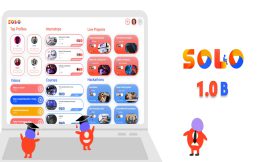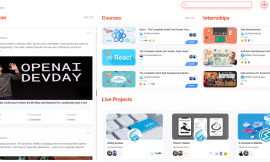Introduction: The Changing Landscape of Learning and Work
The landscape of education and work is undergoing a transformative shift. Traditional degree-focused education systems are being re-evaluated as the demands of the modern job market evolve. Employers are increasingly prioritizing specific, practical skills that align with the rapid advancements in technology and the interconnected global economy.
Skill-based learning is emerging as a vital response to these changes. It focuses on acquiring competencies that are immediately applicable in the workforce, offering a practical approach to education that aligns closely with the needs of today’s employers. As industries continue to change and adapt, the ability to develop and demonstrate relevant skills is becoming crucial for career success.
This article delves into the rise of skill-based learning and its impact on career pathways. We’ll explore how this approach is reshaping education, its benefits for both individuals and employers, and how it is facilitated by major platforms such as Coursera, LinkedIn Learning, and Google Career Certificates. Additionally, we will highlight SOLO Network, a distinct and innovative platform that manages and verifies skill-based learning credentials, connecting learners, institutions, and employers in a unique ecosystem.
The Rise of Skill-Based Learning
Skill-based learning shifts the focus from traditional, degree-oriented education to acquiring specific skills that are directly applicable in the workplace. Unlike traditional education, which often involves years of study culminating in a degree, skill-based learning allows individuals to engage in targeted, flexible training that aligns closely with their career goals.
Coursera offers courses from top universities and companies, enabling learners to gain valuable skills in areas like data science, AI, and business. LinkedIn Learning provides an extensive library of courses aimed at professionals seeking to update their skills or explore new fields. Google Career Certificates provide job-ready skills in high-demand fields such as IT support, data analytics, and project management, offering a fast track into these industries without the need for a traditional degree.
These platforms have been instrumental in promoting the skill-based learning approach, catering to the direct delivery of education and training that meets the evolving needs of the job market.
Advantages of Skill-Based Learning for Individuals
For learners, skill-based education offers several significant advantages:
- Personalization: Learners can tailor their education to their specific career goals, focusing on acquiring the skills that are most relevant to their desired job roles.
- Cost-Effectiveness: Many skill-based programs are more affordable than traditional degrees. Platforms like Coursera, LinkedIn Learning, and Google Career Certificates provide flexible payment options, making education more accessible.
- Speed to Market: Skill-based learning often allows for quicker entry into the workforce, as individuals can gain the necessary skills without the extended timelines associated with traditional degree programs.
Success stories abound of individuals who have leveraged skill-based learning to pivot their careers, upskill, or reskill, demonstrating the transformative potential of this approach.
The Role of Employers in Promoting Skill-Based Learning
Employers are increasingly valuing skills over traditional degrees. In many industries, hiring practices are shifting towards evaluating candidates based on their competencies and capabilities rather than their educational background alone. Initiatives like Amazon’s Upskilling 2025 and IBM’s New Collar Jobs highlight this trend, focusing on training employees in relevant skills and hiring based on competencies.
Partnerships between businesses and educational platforms are also becoming more common, ensuring that training programs align with the specific needs of industries. Platforms like Coursera and LinkedIn Learning offer courses that are tailored to the demands of particular job roles, bridging the gap between education and practical application.
Integration of Skill-Based Learning into Career Pathways
Career pathways are evolving from traditional, linear trajectories to more diverse and dynamic routes driven by skill acquisition. In today’s job market, the ability to map specific skills to career advancement is crucial. This shift is fostering the growth of competency-based education (CBE), which focuses on measuring learners’ proficiency in particular skills rather than their completion of specific courses.
Skill-based learning supports this approach by allowing individuals to build a portfolio of competencies that showcase their professional capabilities. Digital credentials, such as micro-credentials and badges, are becoming vital tools in this process. They provide a clear and verifiable record of skills, which can be displayed to potential employers on platforms like LinkedIn.
SOLO Network: A Futuristic Platform for Skill-Based Learning Management
SOLO Network is at the forefront of managing and recognizing skill-based learning in a digital and interconnected world. Unlike platforms that focus on delivering educational content, SOLO Network provides a robust infrastructure for managing the entire lifecycle of skill-based learning and credentialing.
- Issuing Verifiable Credentials: SOLO Network allows educational institutions and training providers to issue digital credentials that are secure, transparent, and verifiable. These credentials serve as proof of learners’ skills and can be easily shared with employers.
- Building Verifiable Profiles: Learners can compile their credentials into comprehensive profiles that highlight their skills and achievements. These profiles are invaluable tools for job seekers, allowing them to present a trusted and complete record of their capabilities to potential employers.
- Connecting Stakeholders: SOLO Network facilitates seamless interactions between learners, institutions, and employers. Educational institutions can offer programs that meet industry needs, learners can find relevant training and job opportunities, and employers can access a talent pool with verified skills.
- Supporting Career Pathways: By integrating various stakeholders and providing a platform for credential management, SOLO Network supports more dynamic and flexible career pathways. It allows for continuous learning and skill development, ensuring that individuals remain competitive in an ever-changing job market.
- Future-Ready Innovations: SOLO Network is leveraging cutting-edge technologies like blockchain to enhance the security and recognition of credentials. This forward-thinking approach positions SOLO Network as a leader in the evolving landscape of skill-based learning.
SOLO Network’s unique role in managing and connecting different aspects of the skill-based learning ecosystem makes it a pivotal player in the future of education and work.
Challenges and Considerations
Despite its benefits, the widespread adoption of skill-based learning faces several challenges:
- Recognition of Non-Traditional Credentials: Many employers still prioritize traditional degrees over skill-based credentials, which can limit opportunities for individuals who have pursued alternative educational pathways.
- Quality Assurance: With the rapid proliferation of online courses, ensuring that all programs meet high standards of quality and rigor is essential. Accreditation and quality assurance frameworks are necessary to maintain the credibility and value of skill-based credentials.
- Balancing Skills and Knowledge: While focusing on specific skills is important, it’s also crucial to ensure that education fosters broader understanding and critical thinking abilities. This balance is vital to preparing individuals for complex and evolving job roles.
- Digital Divide: Access to technology and the internet is not universal, and disparities in access can limit the ability of some individuals to engage in skill-based learning. Efforts to bridge this divide are essential for equitable access to educational opportunities.
SOLO Network is actively working to address some of these challenges by providing a standardized platform for managing and verifying credentials. By creating transparent and trusted records of learners’ achievements, SOLO Network helps ensure that the skills acquired through various programs are recognized and valued across different sectors.
Future Trends in Skill-Based Learning
The future of skill-based learning is set to be shaped by several emerging trends and technological advancements. One significant trend is the rise of personalized learning experiences, where education is tailored to the individual’s specific needs and career goals. Technologies like artificial intelligence (AI) and machine learning will play a crucial role in developing these customized learning paths.
Another trend is the increasing importance of lifelong learning. As the job market continues to evolve, individuals will need to continually update their skills and knowledge. This shift will likely result in a greater emphasis on flexible, on-demand learning solutions that can accommodate the varying needs of learners at different stages of their careers.
The integration of virtual and augmented reality (VR/AR) into education will also revolutionize skill-based learning. These technologies can provide immersive, hands-on training experiences that are difficult to replicate in traditional learning environments, particularly in fields like healthcare, engineering, and the arts.
Finally, the use of blockchain technology for issuing and verifying credentials will become more prevalent. Blockchain can provide a secure and tamper-proof method for recording and sharing educational achievements, enhancing the trust and recognition of digital credentials.
As these trends unfold, platforms like SOLO Network will continue to play a critical role in managing and connecting the various elements of the skill-based learning ecosystem, ensuring that learners, institutions, and employers can effectively navigate and benefit from the evolving landscape of education and work.




